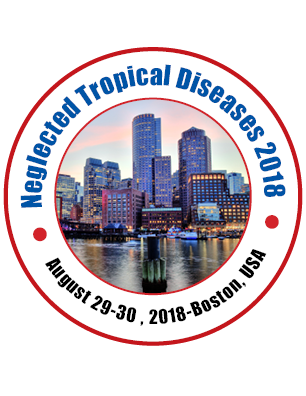
Orok Akwaowo Bassey
Nigerian Institute of Medical Research, Nigeria
Title: High Seroprevalence of Toxoplasma gondii antibodies and asymptomatic falciparum malaria among Hausa and Fulani nomads in urban slum of Lagos state
Biography
Biography: Orok Akwaowo Bassey
Abstract
Toxoplasmosis is the most common zoonotic infection of humans with immense public health importance. Infection gravitates especially in a habitational setting where poverty, ignorance and low level of hygiene holds sway. This cross-sectional study investigates the seroprevalence of toxoplasmosis and co-infection with falciparum malaria among nomads. Eighty-four (84) apparently healthy individuals randomly selected, comprising 53 (63.1%) male and 31 (36.9%) females in Sabo, a nomadic settlement in Ikorodu, Lagos State, Nigeria were enrolled for the study. Questionnaires were administered to capture socio-demographic data. Enzyme-linked immunosorbent assay (ELISA) was used to determine the presence of Toxo-IgG/IgM antibodies in blood samples collected for previous and current infections. Malaria determination was done using SD- Bioline P. falciparum-histidine rich protein2 (pf-HRP2) antigen test kit and microscopy. Data were analyzed using SPSS version 20. From our result, the seroprevalence of anti-Toxoplasma IgG and IgM antibodies was found to be 28 (33.3%) and 84(100%) respectively (P=0.006, P>0.05). Although all the enrollees had previous exposure to toxoplasmosis, new infection was common in males 17(60.71%) and female 11(39.29%). A total of 8 (9.5%) enrollees had asymptomatic falciparum malaria and cases of toxoplasmosis-malaria co-infection were found to be 3 (37.5%). Findings from this study indicate the high level of Toxoplasma gondii infection exposure in a nomadic settlement with recommendations for public education.

